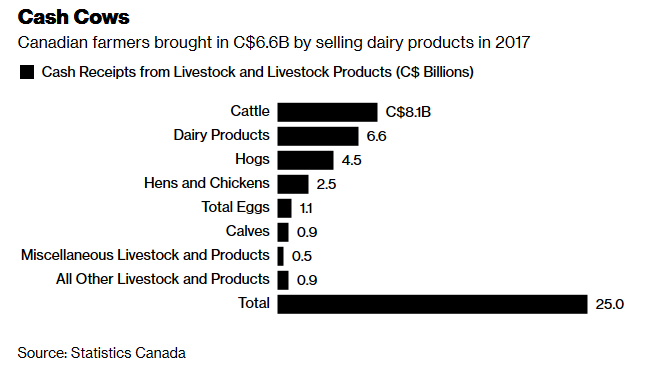Justin Trudeau’s defense of Canadian dairy tariffs isn’t just about farmers and politics — it’s about debt, too.
The prime minister squared off with Donald Trump this month over Canada’s “supply management” system, which sets quotas for dairy, eggs and poultry and charges high tariffs above that threshold. Despite a U.S. surplus on dairy trade with Canada, the president wants to blow apart the Canadian system.
Trudeau is digging in for a variety of reasons, including the financial fallout. Canada’s protected dairy system caps production to avoid oversupply and maintain stable prices for farmers. Permits to sell within supply management’s cap, known as quota, have grown in value and are now worth C$35 billion ($26 billion), with about C$30 billion in dairy specifically. Farmers use quota as collateral, and total farm debt across Canada amounts to C$102 billion — nearly one-third of it lent through a federal agency.
If Trudeau bowed to calls for supply management to be dismantled, he’d be eroding a key asset in a sector to which his government is a key lender.
“It’d be catastrophic because we’ve gone through and assessed and included that value in our business plans and business operations,” said Ralph Dietrich, chairman of the Dairy Farmers of Ontario, an industry group in Canada’s most populous province. “The increased value is because of the desire to be involved in a system that works.”
It’s unclear precisely how much debt is secured by the value of Canadian dairy quota. Farm Credit Canada, a lender owned by the federal government, oversees C$31 billion in loans, as of its last annual report. Of that, C$5.7 billion is in dairy loans. The agency declined an interview request, but said in a statement most dairy loans are secured by a combination of quota and other assets, and just over 1 percent are secured by quota value alone.
Chartered banks also hold about C$38 billion in total farm debt while credit unions hold another C$15 billion, according to Statistics Canada. The agency doesn’t break out dairy debt loads specifically.
Trump, meanwhile, isn’t the only person who has called for an end to the system.
“The value of quota now completely distorts the ability to be productive,” Martha Hall Findlay, president of the Canada West Foundation think tank and a former lawmaker, said in a BNN Bloomberg interview last week. “We should do what we need to do in moving away from supply management with compensation, transition — nobody wants to harm anybody.”
Canada’s biggest cheesemaker also says Trump’s criticism of certain parts of Canada’s dairy system has merit. “I understand the frustration of the U.S. side and quite frankly I think they have every reason to be upset,” Saputo Inc. Chief Executive Officer Lino Saputo Jr. said Monday in a phone interview.
Nafta and TPP
Amid intensifying trade tensions with China, Trump continues to lash out against Canadian dairy tariffs. The U.S. is pressing to abolish supply management altogether in North American Free Trade Agreement talks, which Trudeau’s government expects will continue through summer. Agriculture Secretary Sonny Perdue said the U.S. doesn’t want to “do away” with the system, but would like “more access.” Foreign Minister Chrystia Freeland will update lawmakers on Canada’s position in the talks Tuesday afternoon in Ottawa.
When Canada signed the Trans Pacific Partnership, it gave up a sliver of its market — 3.3 percent on dairy, and other concessions — and washed it down with C$4.3 billion in announced funding for farmers, including C$1.5 billion to support quota value.
Supply management can be lucrative. While the average net worth of a Canadian farm is C$2.8 million, the average poultry and dairy farms are worth C$5.8 million and C$3.8 million respectively, according to Statistics Canada. To be sure, these types of farms also carry more than double the dollar value of liabilities of an average farm in Canada. Still, the expense-to-receipt ratio for dairy operators is 0.77, the most favorable among farming businesses; for all other types of farms, the average is 0.86.
There were 10,525 dairy farms in Canada in 2016, representing 5.4 percent of all farms. Recent farm income data from Statistics Canada show dairy products make up around twice that proportion when it comes to sales — cash receipts from dairy products were C$6.6 billion in 2017, or 10.7 percent of total farm cash receipts.
‘Stupid Policies’
Other countries have included transition funding for farmers to move away from similar systems, according to Jack Mintz, a fellow at the University of Calgary’s School of Public Policy who calls supply management “completely nonsensical” and urges Trudeau to get rid of it.
“It’s of course uncomfortable when you make policy changes, which is why I feel it’s very important to avoid stupid policies in the first place,” Mintz said. Some farmers had to borrow money to buy quota, he said. “That’s why you end up doing something like having transition” funding.
Lyle Vanclief, who served as Canada’s agriculture minister from 1997 to 2003, said neither the Clinton nor Bush administrations pressed to abolish supply management, though countries like New Zealand criticized it and it was always a thorn in trade talks.
“I certainly had some spirited debates and discussion at the WTO,” he said. Trump and others don’t understand supply management, he said. “What’s Trump prepared to give up in order to get it? Nothing, nothing. So I think our government has to stand up.”
Source: bloomberg.com














